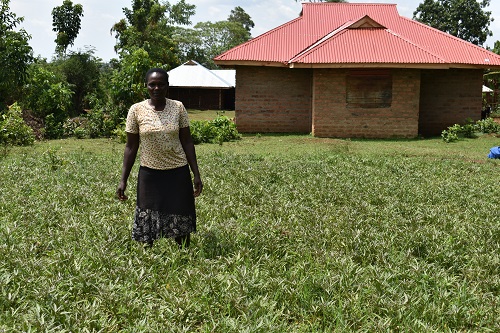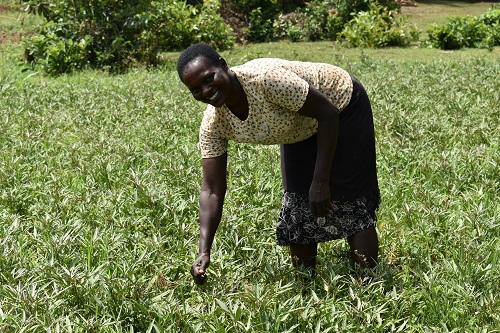“DIG brought me up from a level no one else would have done, I leant a number of techniques that have enables me to succeed even in other projects, I have done all these because DIG opened my potential in farming, DIG connected me to Ministry of Agriculture and I got connected further to CIP. For sure my life has improved beyond what anyone expected.” – Maureen Oboch
Maureen Oboch first joined DIG’s program back in 2016. She is from a small village in North Kamagambo, Rongo District in Western Kenya.
Maureen had lost her husband years back and was widowed with their 5 children. Not only did she become only care giver for her children but also the sole provider. Believing her children should still meet their full potential despite not having their father, she committed to work hard and explore any avenues to help her boost her financially, which is what brought her to DIG.
She offered her land to be used as a learning site for the DIG’s Nutrition Sensitive Agriculture Field School and immediately became a leader in the training.
After participating in the field school, DIG helped Maureen’s group link up with the Ministry of Agriculture (MOA) in Rongo District and the group decided that Maureen should be the group leader and contact person.
One day, she received a phone call from MOA staff that she was required to attend a training by CIP the international Potato Centre, under a partnership with USAID. She attended the training; she was only participant who was not highly educated – everyone else was a retired teacher who decided to venture into farming. She felt a little out of place but was confident in what she had learned during DIG’s farmer field school training with DIG. She emerged as one of the best farmers in the training.

After the training, she was required to start orange fleshed sweet potato multiplication plot, she started it right behind her house. She used a number of techniques that she learned from DIG such as raised beds, and decomposing of organic manure. Her orange fleshed sweet potato farm flourished. She sold seedlings through CIP to other projects that needed clean planting materials; she has since made enough money to build a permanent house and brought down her mud wall house.
During DIG’s last visit with her in 2019, she was ready to pack 200 bags of vines to be sent to a buyer at a cost of KSH.500 per bag (US$5). Maureen still has a vegetable garden and she does not need to buy vegetables to feed her family.
